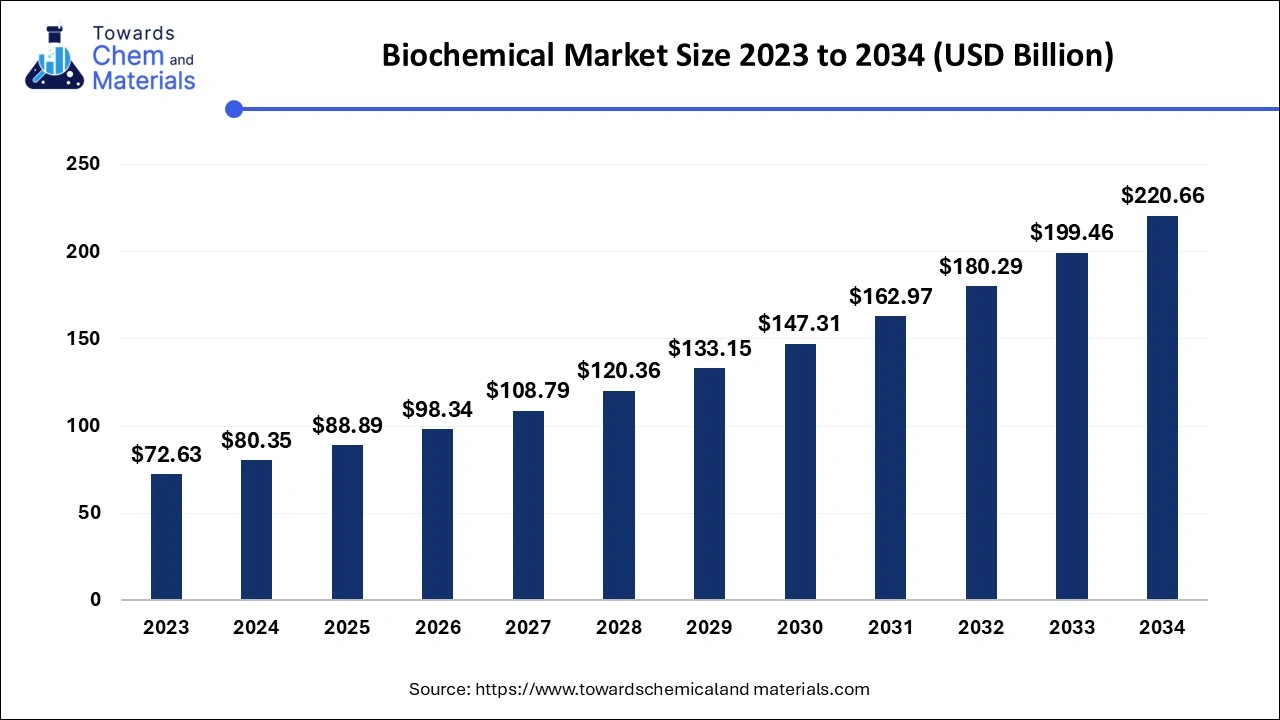April 2025
The global biochemical market size was valued at USD 80.35 billion in 2024 and is predicted to increase from USD 88.89 billion in 2025 to approximately USD 220.66 billion by 2034, expanding at a CAGR of 10.63% from 2025 to 2034. Rising interest among consumers regarding bio-based products, awareness and regulations for environment protection driving the growth of the market.

The chemicals sourced from biomass or biological origin materials like corn, sugar, cellulosic feedstock, and biodegradable waste are known as biochemicals. Bio-chemicals offer a valuable alternative to fossil-based products and help diminish the adverse environmental impacts associated with the latter. The rise in the market is attributed to an escalating demand for eco-friendly products, governmental actions and policies, heightened consumer awareness and preferences, alongside the widening use in various sectors like pharmaceuticals, textiles, food and beverages, automotive and agriculture. Rising demand for biofuel driving the market growth as it provides consumer and nature friendly alternative for fossil fuels.
Indeed, overall demand for the biofuels is set to increase by 23% to reach 200 billion litres by 2028, with renewable diesel and ethanol contributing two thirds of this expansion, while biodiesel and bio jet fuel represent the remaining portion. The increasing need for cleaner fuels is anticipated to boost the biodiesel market throughout the projected timeframe. Biodiesel is a type of fuel for diesel engines derived from fats and oils such as used cooking oil and soybean oil. It is homegrown, nutritious, eco-friendly, and sustainable.
Advancements synthetic biology and metabolic engineering improve the production of biochemicals like bio-based succinic acid, PLA, PHA. Development in fermentation and enzyme technology reducing the cost and efficiency of biochemicals. For Instance, genetic modification has been utilized to alter plant genes to enhance their oil levels whereas metabolic engineering has been employed to enhance ethanol generation from diverse feedstocks.
Algae can yield significant amounts of oil, which can then be transformed into biofuels. Biotechnology likewise allows for the creation and functioning of biorefineries, resulting in more efficient and sustainable practices that collectively accelerate the growth of the biochemicals market.
The elevated cost for bio-based products is higher than that of petrochemicals and the production of biochemicals is costlier. These elements necessitated significant investment in utilizing renewable feedstocks, advanced biotechnological methods, and restricted economies of scale. Consequently, biochemicals are likely to find it difficult to rival more affordable petrochemical options in specific applications and sectors.
Europe is dominated the biochemicals market in 2024. Growth of market is attributed to advancements in the sector of bio-based product and shift towards sustainability. The increasing awareness regarding the environmental pollution due to the excessive carbon emission using petrochemicals and the existence of key players, technological progress, and governmental backing for renewable chemicals contributes to the growth of the market in the region.
Asia Pacific expects the fastest growth in the biochemicals market during the forecast period. The growing use of biofuels is accelerated by swift industrial development, a rising population, and greater disposable income. Bio-based technologies are increasingly popular, particularly in healthcare, cosmetics, and personal care, due to government programs encouraging renewable energy.
Agriculture sector in the regional countries is increasingly adopting bio-based solutions to improve sustainability. The demand for biochemicals is driven by the food processing and pharmaceutical industries, which are impacted by an increase in consumer spending aimed at healthy living. The regional market is projected to expand as amino acid production increases and feed additive exports rise from nations such as China and Japan, fulfilling the strong demand in developing markets.
The biodiesel segment dominated the biochemicals market in 2024. The rising need for clean and renewable fuel sources, along with the growth in global energy consumption, are the key factors propelling the growth of the segment. Whereas the amino acid segment is projected to grow in the forecast period. Rise in the segment is attributed to the growth of pharmaceutical, nutraceutical, cosmetic, food and beverages industries. Also, demand for protein-based products and healthy lifestyle driving the market.
The automotive segment dominated the market in 2024. Rise in the net income of consumers and high living standard and increased biodiesel demand increasing the growth of segment. Furthermore, food processing segment expects a significant growth in the market during the forecast period. The expanding packaged food sector is expected to boost the demand for food ingredients, which in turn is likely to drive up the demand for bio-based chemicals.
By Type
By Application
By Geography
April 2025
April 2025
April 2025
April 2025